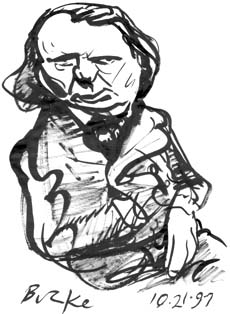Victor Hugo Lives!
Why this strange passion for setting old words to new music?

Composers are always setting to music the words of great poets, but does the music give us any better understanding of the poetry? There is the case of Victor Hugo, a poet of long ago--born in France in 1802, died in 1885--who in recent years has somehow risen ghostily from his grandiose patriot's tomb in the Pantheon to become, in our late 20th century, the poet of the hour, so far as music goes.
Music based on Hugo's writings is everywhere today. Les Misérables, the musical based on Hugo's novel of the same title, opened in France in 1980 and, in a somewhat different English-language version, has been playing on Broadway and touring the United States for 10 years now, with no sign of disappearing soon. Last year Disney came out with an animated movie musical for children called The Hunchback of Notre Dame, based on Hugo's Notre-Dame de Paris. This year, Hyperion Records has issued a CD, Songs by Camille Saint-Saëns, for piano and voice, with 11 of the 27 songs from poems by Hugo. Which is to say, Victor Hugo, rendered into music, is coming at us from three directions today, triophonically, so to speak--as a Broadway extravaganza, as a mass entertainment for children, and more arcanely, as classical music in a 19th-century French style.
You might suppose that Hugo himself, or his shade, faced with these sundry renditions, would take particular exception to the idea of a movie cartoon for children. But that is not so certain. Sometimes Hugo welcomed adaptations of his writings, and as for children, he wrote a volume of poetry, L'Art d'être grand-père, devoted largely to the topic of children's play. It's true that in The Hunchback of Notre Dame Disney has done a wretched job, though. The technique of the Disney empire, like that of The Invasion of the Body-Snatchers, is to get hold of the outer shell of someone else's de-souled creation--Hugo's medieval fantasies, A.A. Milne's stories about Winnie-the-Pooh, or anything at all--and fill it with a creepy, committee-derived, cheerful substance of Disney's own. That is a pity, not to mention a crime.
The songs in Disney's Hunchback, by Alan Menken and Stephen Schwartz, are a mishmash of the ersatz--sometimes imitating the old-fashioned Broadway cleverness of George Gershwin's brother Ira, the lyricist (as in Hunchback's "A Guy Like You," sung by stone gargoyles, which you can listen to briefly by clicking
I went to see Les Mis, the Broadway show, expecting something no better than the Disney production, given the tinsel stupidity of most Broadway musicals today. But Les Mis, as untold millions of theatergoers have discovered before me, turns out to be an intelligent and moving show. Technically speaking, it is an opera, all singing and no talking--except that, unlike a regular opera, the music, by Claude-Michel Schönberg, is intended strictly as a velvet background (velvet? Click
The lyrics tell a story that sticks pretty closely to Hugo's novel and even to its left-wing spirit, which I much appreciate. Les Mis is decently Hugolian in that respect. Even the rhyming couplets stand closer to Hugo's spirit than you might imagine. His own theater plays--his play Hernani, for example, which set off a riot in Paris when it was originally staged in 1830--consist in large part of very similar verse. The only difference is that, in Hugo's original writings, the wordy rhymed couplets conjure a feeling of endless verbal ingenuity, advancing majestically at a stately pace--whereas, with the lyricists' committee at Les Mis, everything rushes forward pell-mell, as always in modern Broadway productions, and clichés tread on one another's heels, and you have this feeling of a hidden stage director crying, "Next! Next!"
I f you want the true Victor Hugo rendered into music, you have to get hold of Hyperion's CD of Songs by Camille Saint-Saëns, very capably performed by the baritone François Le Roux and the pianist (and music scholar) Graham Johnson. The songs are in French, of course, which is part of what it means to have the true Hugo, who once said, "The measure of a nation's intelligence is its ability to speak French." They are written in the light, teary, lovely style of 19th-century French song--the style that you can see in a little pastoral love poem of Hugo's, with the singer and pianist joined by Philippa Davies on flute, by clicking
But is there any advantage in listening to Hugo--or to any poet--through the soundboard of a composer's music? I find it enjoyable to listen to the musical settings by Saint-Saëns, but then again, a little disappointing. Poetry contains its own music, even if the music is only hinted at, and if some composer comes along and fills in the hints with imaginings of his own, the effect is to close off possibilities for your own imagination. Claude Debussy once said to the poet Stéphane Mallarmé that he had set a poem of Mallarmé's to music--to which the poet is said to have replied, "I thought I had already done that."
The splendidly incongruous 20th-century musical resurrection of Victor Hugo makes me conclude that, when composers set a poet's work to music, the best thing to do is, in the case of a fiasco like Disney's Hunchback, to stay away completely, and in the case of a show like Les Mis, to enjoy the story without paying any attention to the literary art. In the case of a Saint-Saëns, on the other hand, the best thing is to savor the musical settings and the words, too--and then put aside the music to enjoy Victor Hugo, the poet, as presented by himself on the printed page, with piano accompaniment and vocal sonorities provided by your own dreamy imagination.